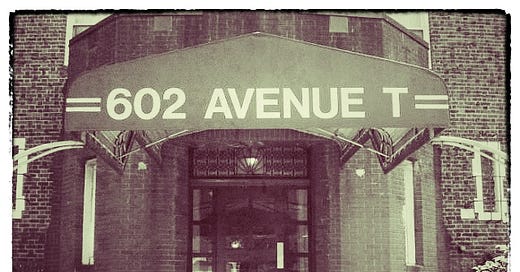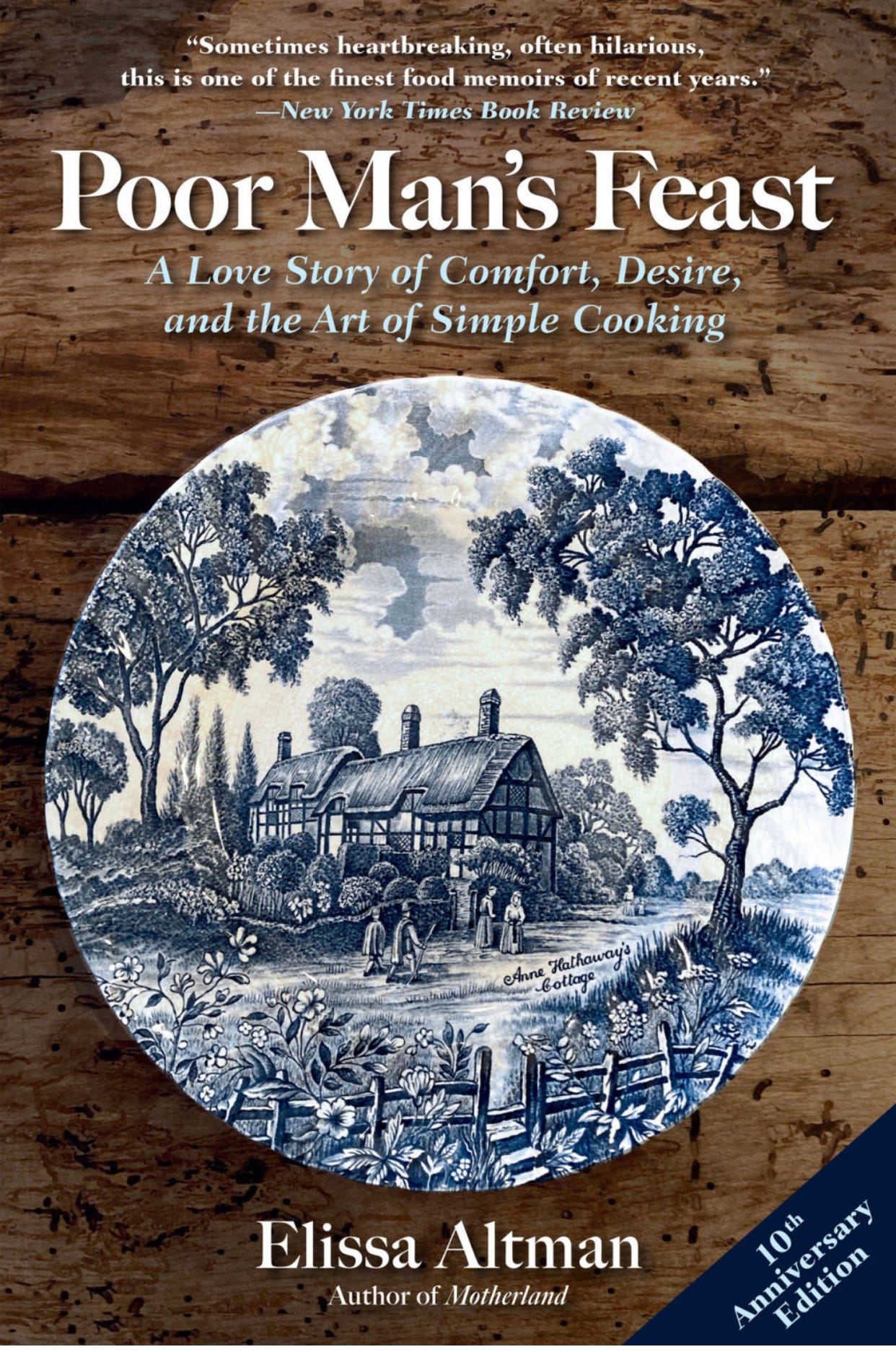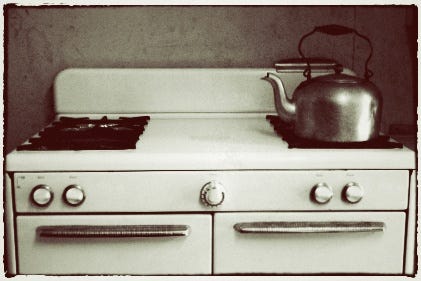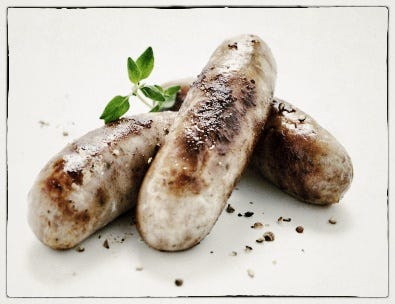In March 2023, Open Road Media released a new digital edition of my first memoir, Poor Man’s Feast: A Love Story of Comfort, Desire, and the Art of Simple Cooking; on June 27th, Blackstone Publishing released the unabridged audio edition, and also the unabridged audio edition of my second book, Treyf, both of which I narrated. This essay was the foundation of chapters in both books about returning to The Scene of the Crime — the place where my father was raised, where our family stories and myths were born, and hundreds of dinners made. I am also including a great, light recipe which has shown up in many other places (sometimes attributed, sometimes not; sigh).
Family lore:
My dad was nine when a neighbor living on the south side of Ocean Parkway offered my grandfather first crack at the gorgeous 1920s Spanish-style house he was putting up for sale because he was moving to L.A. It was around 1934, the Depression was not yet over, and the $25,000 price that Jay Silverheels asked was too steep; my grandfather chose to stay in the two bedroom apartment he shared with his wife and children. Rejecting the man who played Tonto, my grandparents would remain at 602 Avenue T for the rest of their lives; they lived there, and they both died there.
I’m not sure what it was about the place; it wasn’t the view, although the east-facing bedrooms were cooled by the breezes blowing in off Coney Island, and on a clear day you could see the Parachute Drop and the Cyclone. A Knabe baby grand piano sat in the dark living room adjacent to the window and up against a steam radiator, which would eventually cause its deep mahogany finish to bubble and peel, and its ivory keys to craze like porcelain. A posterboard-mounted print of Breugel’s The Harvesters hung above a yellow-striped Duncan Phyfe sofa, popping out of its Rococo frame, concave with the humidity of sixty Brooklyn summers. By the time I moved in — 1990, after a very bad breakup — the Breugel field hands had grown distorted and grotesque, like the Matthew Brady images of dead soldiers on the fields of Gettysburg.
I went to 602 to heal my wounds; I had nowhere else to go. It was where my father, twelve years earlier, had gone to heal after he divorced my mother; he had nowhere else to go. Back then, in 1978, my grandmother was still alive, shuffling around the place in a series of pearl-white vinyl slippers, the kind designed to look like ballet shoes; kitchen to foyer, foyer to bedroom, bedroom back to the kitchen where, one Sunday afternoon in 1974, the day after I saw Young Frankenstein at the Ziegfield, she served me a whole boiled calves brain on a small white luncheon plate flecked with tiny magenta petunias.
Each of us has an immediate olfactory connection to our grandparents, and mine was launched during the late Sunday mornings of my childhood, when I walked into their lobby at 602; it smelled, perpetually, of chicken fat. Nearly every tenant in the building was religious, and that many people cooking that much griebenes under one roof had taken its toll: the essence of schmaltz had been sucked into the pores of the place. When I came back to 602 in 1990, the building still reeked. I feared for my clothes. I was certain that my cats would stink like a pair of fat Shabbos pullets.
The apartment had been uninhabited for the two years since my grandmother died; my father had moved into his girlfriend’s house a few years before that, but he decided to maintain the place anyway. He left the electricity turned on. The phone stayed hooked up (Essex5-1177). My grandmother’s clothes were still hanging in the closet when I moved in; her makeup and hairbrush were still in the medicine cabinet. When my father checked in on me that first night, his call set off the phone amplifiers that hung near the ceiling in every room — my grandmother was profoundly hard of hearing in her later years — which shook the walls and windows and made the cats shriek; he never had them disconnected after she died. He was calling, he said, to give me some advice for living there comfortably.
“Don’t turn on the stove—“ he warned that first night.
“But what if I want to cook?”
“Use the top burners, but never more than two at a time. And don’t light the oven. I’ll take you to Macy’s tomorrow, to buy a microwave.”
I was suddenly single, bereft, living in my long-gone grandmothers’ apartment along with all of her things — there was an unopened jar of gefilte fish in the refrigerator and a half-eaten box of Coffee Nips on the foyer table, like she had just stepped out to do an errand — and I couldn’t even roast myself a chicken without blowing the place up.
My cookbooks — hundreds of them — were packed in boxes that sat piled up in the living room along with what little furniture I owned; my cookware stayed buried under layers of bubble wrap. There was no reason to unpack it: I couldn’t bake a pie or a loaf of bread. I couldn’t broil a piece of salmon, make a lasagna or a brisket, oven-braise root vegetables or a leg of lamb. I couldn’t bake a frittata or make a pizza, or brownies, or a timbale.
I couldn’t even bake a potato.
We went to Macy’s the next night, and my father bought me a microwave big enough to be an end table.
“There’s a roast chicken setting—“ he said, pointing to its front panel. We took it home, plugged it in, and it immediately blew one of the two fuses that powered the entire apartment.
We went out for dinner to a nearby Chinese restaurant called Karr’s, and ate at a small table near the bar, and got drunk on Gin Gibsons.
“So where do I buy food?” I asked, over plates of shrimp in lobster sauce and pork fried rice.
“On King’s Highway,” he said.
“Is there anything closer?”
“Avenue U—near the F train. But your grandmother never shopped there.”
I couldn’t understand why. It was a short walk; there were no taxis or buses involved in getting there. But during my first week at 602, none of that mattered, because, for the first time in my adult life, I didn’t cook. I ordered pizzas that made my Orthodox neighbor gasp in horror when the delivery guy passed her in the hallway carrying the grease-stained, white cardboard box stamped SAUSAGE. I ordered Chinese food. I took the subway to Park Slope and ate at a vegetarian restaurant on 7th Avenue near Union.
But I didn’t cook.
Not once.
A week later, after coming down with a terrible cold I attributed to depression-related stress, I left work early and, trying to walk from the subway station on Avenue U and McDonald Avenue to Ocean Parkway, found myself navigating a wall of fast-moving, tight-lipped older ladies pulling empty grocery pull-carts behind them. It was two o’clock. I was hungry. So I turned around and followed them under the elevated F train tracks to the other side of Avenue U, where my grandmother never went.
There was a cheese shop and a tiny green grocer selling fresh fava beans and baskets of spikey, green puntarelle. There was a pork and sausage store that also sold fresh and dried pasta; a bakery selling fresh semolina bread dotted with sesame seeds; a fishmonger, and a butcher. The ladies were all doing their marketing, to make dinner that night.
I wilted the bitter puntarelle in a pot of salted, boiling water, tossed it with orrechiete cooked in the vegetable water, and folded giant spoonfuls of thick, fatty sheep’s milk ricotta into the warm pasta.
Hoarse, I asked the cheese man for Taleggio; he just shook his head, no. An older woman wearing a jet black cardigan, jet black wool skirt, and suntan pantyhose eyed me up and down like I’d just arrived from Mars.
But don’t go anywhere—the cheese man continued. Just wait a minute.
He went into the back of the store and a few seconds later returned with a demitasse cup.
Drink it all at once—for your cold. Come back tomorrow. I close at six.
Every day, I did my shopping on Avenue U, and every day, the little old Italian ladies in black grilled me about what I was making and how I was making it. Sometimes they nodded in approval, and asked me where I lived, and whether I was single because they had a nice grandson. Sometimes — usually — they corrected me. Fiercely. But kindly. When I said I couldn’t bake anything because the oven might explode, they said You don’t need an oven.
I drizzled warm, sectioned figs with the dregs of my grandfather’s Slivovitz that I found in the depths of the hall closet, buried behind torn shopping bags bursting with the fading letters that my father had written to his parents from the Pacific during World War II when he was nineteen.
At the pork store and the greengrocer, I bought anything I could cook on top of the stove: there were thick fennel and garlic sausages that I simmered with red wine, grapes, and thyme; fava beans that I boiled and shelled and mashed into a topping for the semolina bread that I toasted in an oil-slicked skillet and then rubbed with garlic; I wilted the bitter puntarelle in a pot of salted, boiling water, tossed it with orrechiete cooked in the vegetable water, and folded giant spoonfuls of thick, fatty sheep’s milk ricotta into the warm pasta. In the coming months — eighteen of them, before I moved back to Manhattan to get on with the business of my life — my grandmother’s ancient aluminum pots clattered on the stovetop, their bottoms rounded and dimpled with age. I chopped with my great-grandmother’s hockmesser — the four pound, wood-handled cleaver she carried over from Romania; I steamed what needed steaming in a white enameled colander set over a pot of boiling water; I wine-braised spatch-cocked pigeon in an old Teflon fry pan covered with a warped cookie sheet; I dredged Branzino in seasoned egg and flour and slid it into a hot, butter-coated 1930s oval metal casserole that had baked decades of kugel; I drank cheap red wine out of the tiny four-ounce milk glasses of my childhood Sunday afternoons; I drizzled warm, sectioned figs with the dregs of my grandfather’s Slivovitz that I found in the depths of the hall closet, buried behind torn shopping bags bursting with the fading letters that my father had written to his parents from the Pacific during World War II when he was nineteen.
602 was the place I went to get my bearings, and to relearn who I was, just as my father had after his divorce. When I moved out — when it was time to get back to my life — I took nothing with me: not the hockmesser or the Slivovitz, the time-warped Breugel or the juice glasses. I left with my cats, and my cookbooks —still sealed in their moving boxes from the day I arrived — and tucked the stash of my father’s wartime letters in my knapsack. The only other thing I grabbed before I walked out was the sheaf of wrinkled, handwritten notes I’d scrawled while standing in the stores on Avenue U with the Italian ladies, who taught me that sustenance begins and ends with imagination and ingredients, and who forever changed the way I think about food, and what it means to feed myself and those I love despite the obstacles of place, time, and history.
Braised Sausages with Grapes and Thyme
As much as I’d like to say that, like Richard Olney, I once braised sausages in a young tannic red and then roasted them over grape vines plucked from the rich soil of Provence, I can’t: I first made this dish in my grandmother’s apartment near Coney Island, with grapes of unknown provenance and dried thyme that had seen better days when Nixon was in office. Still, the dish is very simple to put together, and over the years I’ve made it in every conceivable permutation: Bratwurst braised in black beer with sliced red onion and juniper berries, and then grilled; mild garlic sausage braised in sweet white wine and then grilled and topped with German mustard; Merguez braised in Ouzo and mint. I’ve even made this with great vegan sausages, and it surprised and delighted my vegan friends. The only hard-and-fast rule about making this dish is that you make it with excellent-quality sausages, be they lamb, pork, chicken, turkey, or vegan. And if you prefer your sausages with a bit of char (the way I do) finish them on a hot grill or in a stovetop grill pan, and serve them in their braising liquid.
Note: If you don’t drink and can’t cook with alcohol, replace the black beer I mention above with an alcohol-free version. Alcohol-free wine is also available, some of it good quality and some of it paint-stripper. If you don’t buy AF products, send me a direct message and I’ll help.
Serves 2 (or 1 with leftovers)
1 tablespoon mild extra virgin olive oil
4 fennel and garlic pork sausages, poked a few times with a fork, at room temperature
3/4 cup dry red wine
1/4 pound red seedless grapes
3 healthy sprigs of thyme
Set a large cast iron skillet over a medium flame, and after a minute or so, slick it with the olive oil. Add the sausages and cook until golden on all sides. Remove to a plate and set aside.
Carefully pour in the wine and increase the heat to medium high; cook until the wine begins to bubble and slightly thicken. Return the sausages and any of their accumulated juices to the pan, add the grapes and the thyme. Reduce heat to low, set a cover on the pan (slightly askew), and cook until the sausages are done, about 8-10 minutes depending on their size. Serve with the grapes and the thyme on polenta, rice, or with slices of garlic-rubbed toast, drizzled with the wine sauce.
Note: If the wine has thickened too much by the time the sausages are cooked, add tablespoons of water (or more wine) — one at a time — and stir to loosen the sauce up.









Elissa, The beauty of your prose always takes me to the people and places that form your subjects. From the cool summer breeze to the hockmesser, my senses are gripped. I appreciate your pieces in the dual meaning of the word “appreciate”. I wish we had known each other in high school. We certainly had much in common. All these years later, I’ve gotten to know you from your writing. I’m grateful for it.
This was so beautifully written it made my heart hurt. Your descriptions of your grandma’s kitchen reminded me of my grandma’s kitchen, the vintage unfussy cookware and juice glasses from childhood(!). I have one of those juice glasses in my house now and every time I use it I have all the feelings of being transported back to grandma’s kitchen.
Why didn’t your grandmother shop on Avenue U? It sounds absolutely glorious. I would also shop there every day like you did.